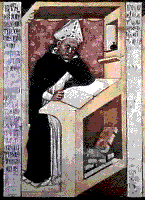Already called "the Great" (Magnus), Albertus was accepted as an authority equal to Aristotle in philosophy and was known as "the universal doctor" for his work in natural science.
While studying arts at Padua, he was received (1223) into the Dominican Order and spent the next 18 years studying and teaching theology at Cologne and other Rhineland priories. He received his doctorate at the University of Paris in 1245 and taught there for three years. His extraordinary abilities were recognized in 1248 when he was assigned to open the first great center of learning in Germany at Cologne, which eventually became the University of Cologne. Although Albert was provincial of the Dominicans (1254-57), bishop of Regensburg (1260-62), and preacher of the Crusades (1263-64), his main work was paraphrasing and commenting on Aristotle's philosophy. In doing so, he added new areas of investigation. He staunchly advocated the autonomy of human reason and natural experience in defense of the Christian faith. His collected writings on Scripture, philosophy, and natural science fill more than 40 volumes. His work on Aristotle is one of the cornerstones of the realist philosophy that constitutes the synthesis of Thomas Aquinas.
Albert was beatified by Gregory XV in 1622. On Dec. 16, 1931, Pope Pius XI declared him a saint and a doctor of the church. Feast day: Nov. 15.
